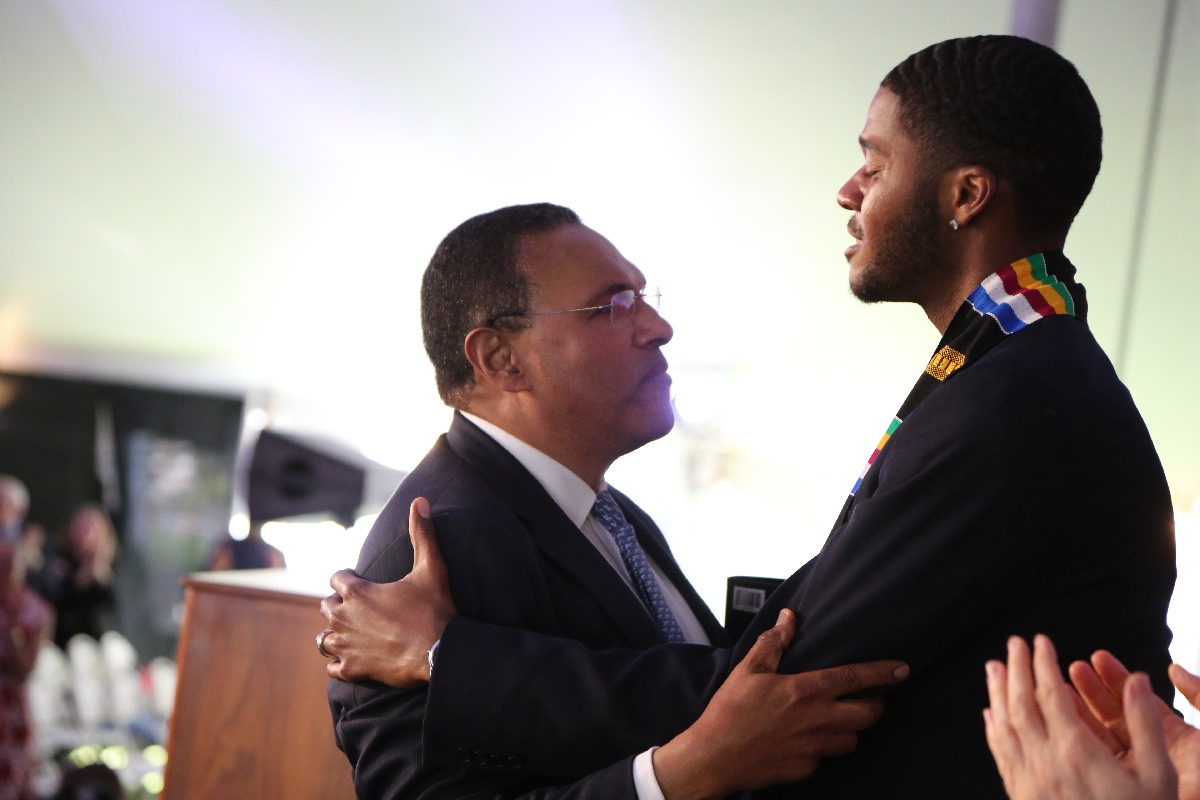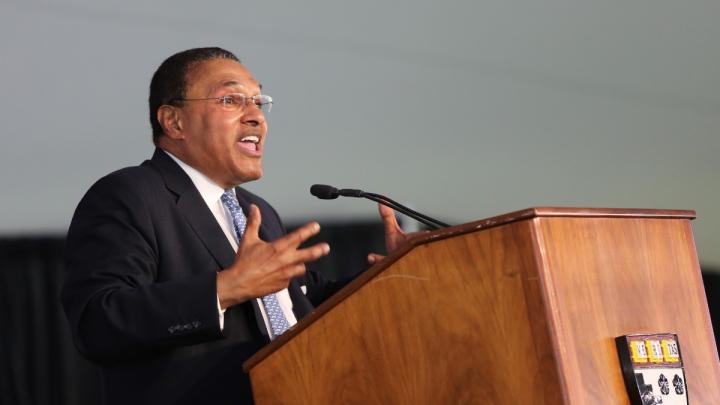On a Wednesday afternoon that sweltered past 80 degrees, an audience of several hundred filled the tent in Radcliffe Yard for the Harvard Graduate School of Education’s convocation exercises. The keynote speaker was educator and mathematician Freeman Hrabowski III, LL.D.’10, president of the University of Maryland, Baltimore County (UMBC), a research university that specializes in sending minorities and women, as well as students from low-income backgrounds, into the STEM fields of science, technology, engineering, and math.
Regarded as a pioneer in education—his success at UMBC has inspired imitators across the country—Hrabowski grew up in segregated Birmingham, Alabama, and as a 12-year-old joined Martin Luther King’s Children’s Crusade march in 1963. During the demonstration, he was spat on by Bull Connor, Birmingham’s infamous commissioner of public safety, and afterward thrown in jail for five days. “It was an awful experience, but a rich experience,” he said. “It opened up our city, and all of a sudden we started to look at the possibility of children going to all kinds of schools.”
Hrabowski first joined UMBC in 1987 as vice provost, and the following year he co-founded, with philanthropist Robert Meyerhoff, the Meyerhoff Scholars Program, which helps propel minority, women, and low-income undergraduates into STEM careers. The program has become a national model; a New York Times profile asserted that Hrabowski “has probably done more to encourage interest in science and math among minority and low-income students than any other educator.” And in bestowing an honorary degree on Hrabowski in 2010, Harvard president Drew Faust called him “a galvanizing force in his university’s ascent.”

Hrabowski congratulates Donovan Livingston Ed.M. ’16
Photograph courtesy of the Harvard Graduate School of Education
At the HGSE ceremony, Hrabowski was preceded onstage by imminent Ed.M. candidate Donovan Livingston, who delivered a powerful, and fitting, address in the form of a spoken-word poem. A native of Fayetteville, North Carolina, Donovan heads this fall to the University of North Carolina at Greensboro for doctoral study in educational leadership and cultural foundations, and his poetic contemplation on freedom, education, and equality—and of African Americans’ difficult, entwining histories with all three—brought the audience to its feet for a standing ovation.
The poem’s title is “Lift Off.” Livingston began:
“Education then, beyond all other devices of human origin,
Is a great equalizer of the conditions of men.” – Horace Mann, 1848.
At the time of his remarks I couldn’t read—couldn’t write.
Any attempt to do so, punishable by death.
Describing the education system’s enduring inequalities—“For some, the only difference between a classroom and a plantation is time,” he said—and the way its efforts at “diversity” make some students “feel like quotas,” Livingston offered a series of exhortations to his fellow graduates:
As educators, rather than raising your voices
Over the rustling of our chains,
Take them off. Un-cuff us.
Unencumbered by the lumbering weight
Of poverty and privilege,
Policy and ignorance.
He recalled his seventh-grade teacher, who first awakened him to writing and to self-expression: “She told me that our stories are ladders / That make it easier for us to touch the stars.” And he talked about seeing “constellations” in the eyes of his own students: “If you take the time to connect the dots, / You can plot the true shape of their genius.”
The poem closed, with a potent echo of its first line—and a call to action:
Education is no equalizer —
Rather, it is the sleep that precedes the American Dream.
So wake up—wake up! Lift your voices
Until you’ve patched every hole in a child’s broken sky.
Wake up every child so they know of their celestial potential.
I’ve been a Black hole in the classroom for far too long;
Absorbing everything, without allowing my light to escape.
But those days are done. I belong among the stars.
And so do you. And so do they.
Together, we can inspire galaxies of greatness
For generations to come.
No, sky is not the limit. It is only the beginning.
Lift off.
When Hrabowski took the podium, he called Livingston a “twenty-first-century Martin Luther King.” In his own address, he told stories about his grandmother’s blueberry pie, quoted author Zora Neale Hurston, and spoke about the difference an education can make in a child’s life. Noting a persistent—and since the 1990s, widening—inequality in the numbers of blacks and whites who earn college degrees (a topic Faust took up last week when she spoke at UMBC’s commencement), Hrabowski encouraged HGSE graduates to carry on the values of community and collaboration that animated the civil-rights movement: “we must get away from the cutthroat approach” to science education, he admonished. “You know, most students in America don’t make it in science.… We must get away from the idea that we weed students out of science.”
He encouraged graduates to listen to their future students’ differing perspectives while also holding them to high expectations. Recalling the words of his late mother, who herself taught literature for 40 years, Hrabowski told graduates that there are “two groups of people in our society: people whose dreams become a reality because they get the skills they need to get a good job, and then people whose dreams are, in the words of Langston Hughes, forever deferred. And my mother kept saying, ‘We the teachers make the difference.’”
Hrabowski offered up stories about UMBC students who’d gone on to graduate work and careers at prestigious institutions, including Harvard. He described a young man who came to UMBC as a ward of the state; a teacher in his group home had pushed him to keep focused on school. And about the Georgia CEO, a white man who grew up in poverty—his father dead, his mother a sharecropper—who told Hrabowski that the Civil Rights Act had opened the possibility of a college education not only for his African-American neighbors, but for him and his sister, too.
More than once, Hrabowski returned to recollections of his mother. As a young girl in a small town outside Birmingham, she was offered the choice of working in the cotton fields or as a maid in a rich family’s house. She chose the latter. “She wanted to see how rich people lived,” Hrabowski explained. Plus, “this rich white home had a library, at a time when there was no public library for children of color.” After her work was finished, she was allowed to sit and read, and to take home books from the library. “And she began to forget about being a poor little girl and to know that maybe the world could be bigger for her,” Hrabowski said. Returning later to the same idea, he added, “She said, ‘Teachers touch eternity through their students.’… And that is my point to every one of you. Whatever you’re going to do in education, you are a teacher. I went back and spoke in Birmingham, and all these people came up to me and said, ‘Your momma didn’t teach me to read, she taught me to love to read.’ It is the relationship with students… that will be the essence of your work and life.”









